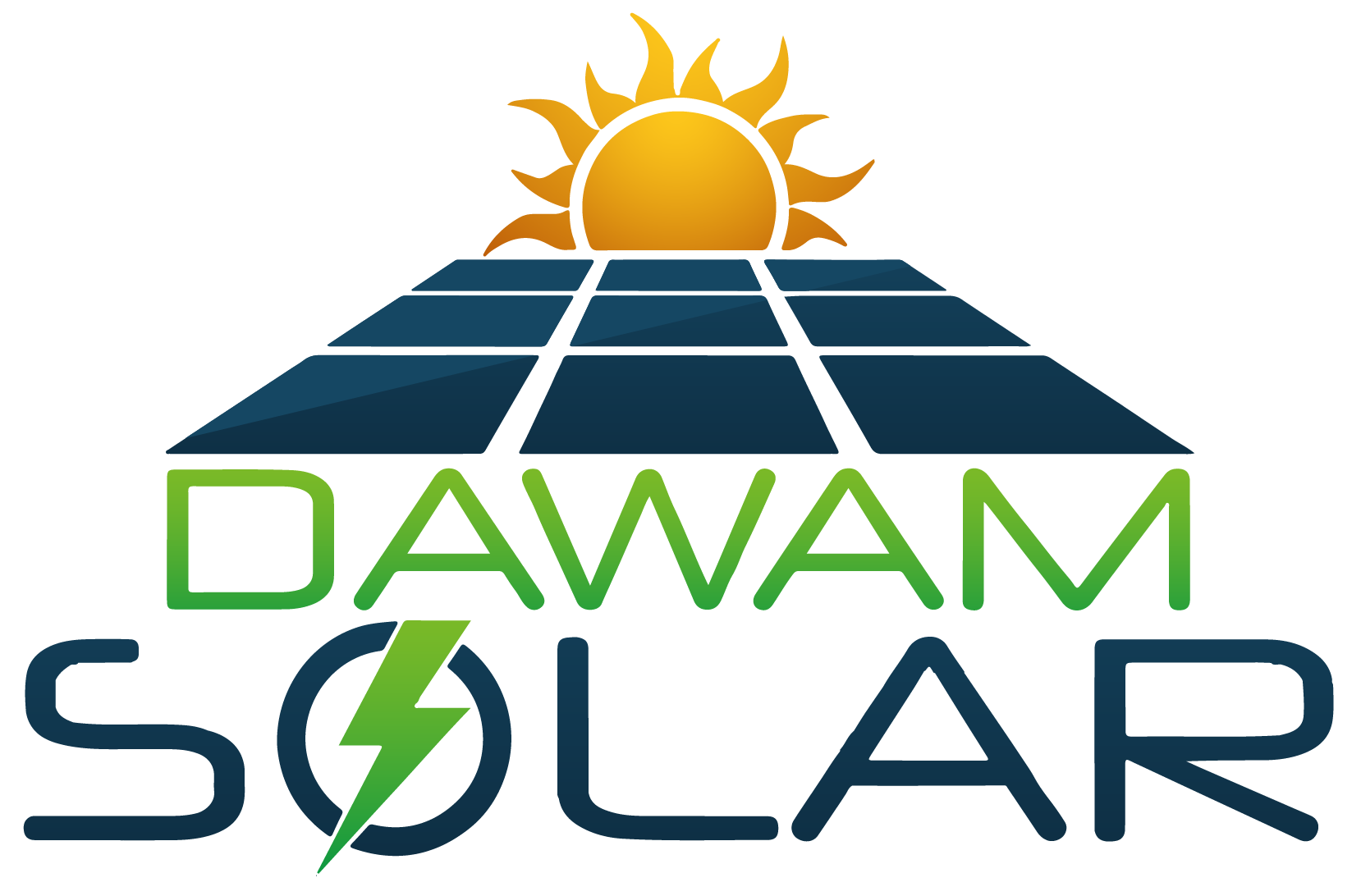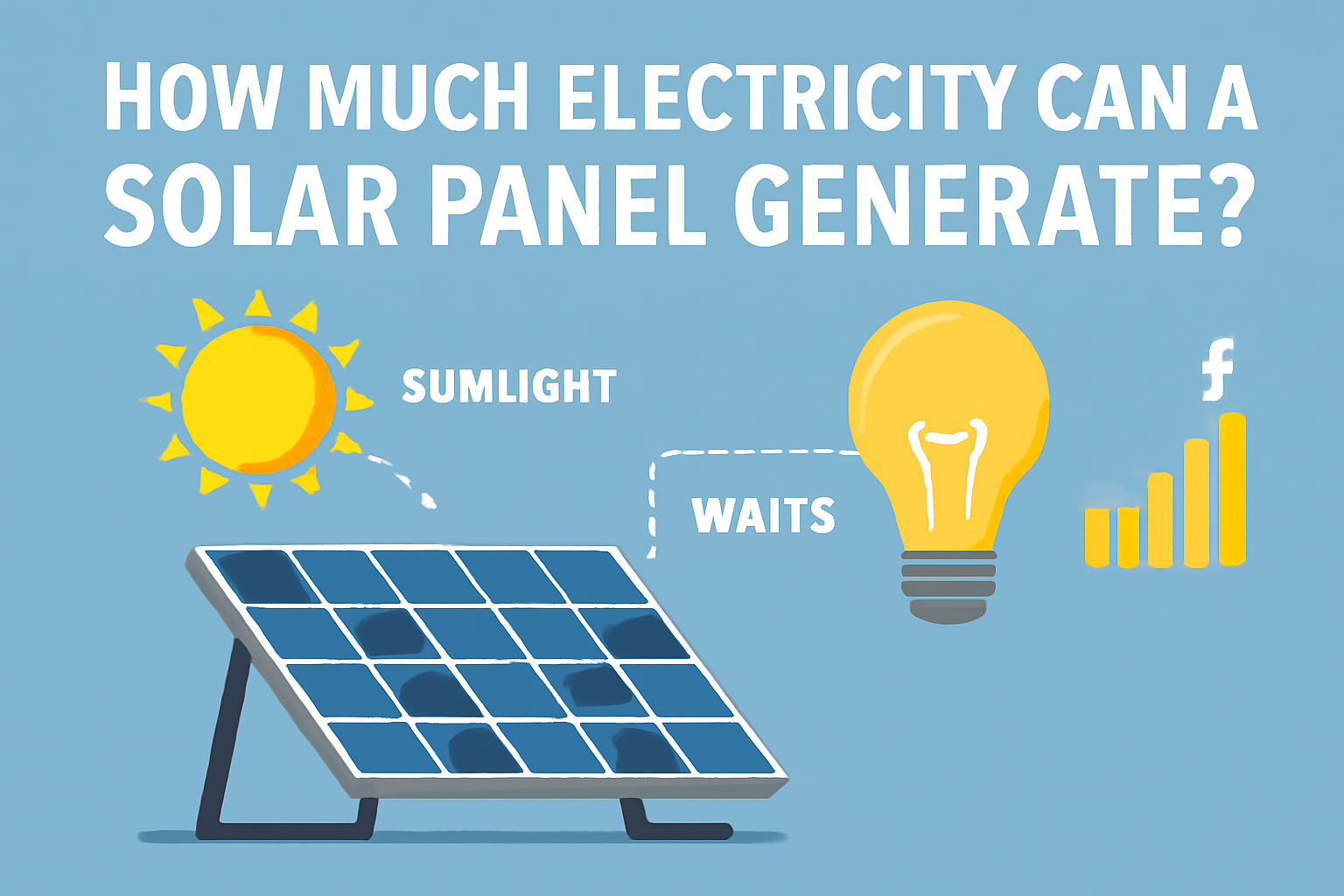In Pakistan, so many people have chosen solar panels for electricity in recent years. Because in Pakistan, electricity prices are increasing rapidly, as well as many areas facing load-shedding issues. So in this case, solar panels seem to be a great choice. As Pakistan gets a lot of sunlight, solar panel system installation will be an amazing decision. Many families and businesses are now using solar systems to save money and get steady electricity. Solar power is not only cheaper but also good for the environment. It helps people rely less on power companies, which sometimes can’t meet the demand. More and more people want to use solar energy in the best way. But one common question is: how much electricity can a single solar panel produce? Here we will guide you about solar panels, their efficiency, and how much electricity they can generate.
Table of Contents
What Is a Solar Panel?
A solar panel is a device that turns sunlight into electricity. It is made of small parts called solar cells, usually made from silicon. When sunlight hits these cells, they make electricity, but it’s not ready to use at home. A solar inverter changes it into usable electricity called AC (alternating current). This AC power can run things like lights, fans, and TVs. Solar energy is a clean and renewable way to help lower your electricity bills.
Types of Solar Panels
Before going towards how much a solar panel generates electricity. Here are some of the common types of solar panels that are usually used in Pakistan:
Monocrystalline panels
- Monocrystalline panels make more electricity from sunlight than other types.
- They work better in hot weather, which is great for warm places.
- Even though they are more expensive, they last a long time and give good value.
Polycrystalline panels
- Polycrystalline panels are less efficient, meaning they produce less electricity from the same amount of sunlight.
- They are cheaper than monocrystalline panels, making them more affordable to buy.
- These panels work best in mild climates where extreme heat is not an issue.
Most people in Pakistan use monocrystalline panels now because they give better output in our climate.
Electricity Generation Basics
To know how much electricity a solar panel makes, we need to understand what wattage means.
In Pakistan, most solar panels are between 330 and 550 watts.
For example, if a 550-watt panel gets 1 hour of full sunlight, it will make 550 watt-hours (Wh) of electricity.
If it gets 5 hours of sunlight a day, it will make 2.75 kilowatt-hours (kWh) (which is 550 × 5 = 2750 Wh).
To know how much electricity your whole system will produce, just multiply this number by the total panels you have.
How Much Sunlight Does Pakistan Get for Solar Energy?
Pakistan gets a lot of sunlight almost all year. Most of the areas of Pakistan get 7-8 hours of sunlight. So solar panels are a great choice for Pakistan. Cities like Karachi, Lahore, Quetta, Multan, and Islamabad are perfect for using solar panels to generate electricity because of their abundance of sunlight.
What Affects Solar Panel Electricity Output?
Here are some of the common reasons that can affect solar panel electricity output:
- The more sunlight your panels get, the more electricity they can produce.
- Dusty or cloudy weather can reduce how well your panels work.
- In Pakistan, panels should face south to catch the most sunlight.
- Setting the right angle helps panels get more sunlight and make more electricity.
- If dust or dirt covers the panels, they won’t work as well.
- Using good-quality panels and inverters helps your system produce more electricity.
How Much Electricity Does a Solar System Generate?
Here’s a look at different solar system sizes and how much electricity they can generate:
- 1 kW System (2 panels of 550W), it can produce around 6.6 kWh per day and 198 kWh per month. Good for a small room or just fans and lights.
- 3 kW System (6 panels of 550W), it can produce around 19.8 kWh per day and 594 kWh per month. Suitable for a small home.
- 5A 5 kW system (9–10 panels of 550W) can make about 33 units of electricity per day and around 990 units per month. It is a good choice for a medium-sized home or office.
A 10 kW system (18–20 panels of 550W) can make about 66 units per day and around 1980 units per month. It works well for a big house or business.
How Many Units Does My Home Use?
To plan your solar system, you need to know your monthly electricity usage. Here’s an average:
- Small home: 300–500 units/month
- Medium home: 600–1000 units/month
- Large home: 1000–2000+ units/month
You can check your electricity bill to see your actual usage.
Benefits of Using Solar in Pakistan
- Lower Electricity Bills: After installing solar panels, your electricity bills go down, helping you save money.
- Reliable Power: You won’t need to worry about power cuts.
- Environment Friendly: Solar power helps reduce pollution and harmful emissions.
- Government Net Metering: You can sell any extra electricity you make back to the company.
What Is Net Metering?
Net metering is a system that connects your solar setup to the national grid. If your solar system makes more electricity than you need, the extra power goes to the company, and your meter runs backward, reducing your electricity bill. This means:
- You get credit for excess units.
- Your monthly electricity bill can be zero or even negative.
This is especially helpful in summer when solar production is high.
Cost of Solar Panels in Pakistan
Prices can vary depending on the brand, system size, and installer. As of 2025:
- Per watt price: Rs. 90 to Rs. 130
- 5 kW system: Rs. 6.5 to 8.5 lakhs
- 10 kW system: Rs. 12 to 15 lakhs
The cost of a solar system includes panels, an inverter, and installation. Extra costs like batteries or net metering may be added based on your setup.
How Long Do Solar Panels Last?
- Most good-quality panels last 25+ years.
- Inverters usually last 10–15 years.
- Batteries (if used) last 3–5 years.
Regular maintenance like cleaning and inspection can improve lifespan.
Is Solar Energy Enough to Run My Whole House?
Yes, with proper planning. A 5 to 10 kW system is enough to run a medium to large household in Pakistan, including:
- Lights
- Fans
- Refrigerators
- ACs
- Washing machine
- TV
- Computers
For 24/7 backup, you may need batteries or a hybrid system.
Conclusion
Solar panels are a smart and useful choice for people in Pakistan. They work well because we get a lot of sunlight throughout the year. Electricity bills are getting higher, so solar can help you save money. A 550-watt panel can produce about 3.3 units of electricity daily. That means around 99 units in one month from just one panel. With net metering, you can sell extra electricity back to the company. Solar energy is clean, reliable, and good for Pakistan’s future.
FAQs
1. How many solar panels do I need for my home?
It depends on how much electricity you use. If you use around 800 units per month, you’ll need a 5 kW system, which means about 9 to 10 panels of 550 watts each.
2. Can I run an air conditioner on solar power?
Yes, you can. A 5 kW or bigger system can run an AC. A 1.5-ton inverter AC uses about 1.2 to 1.5 units per hour, which solar panels can easily handle during the day.
3. What is the best direction for solar panels in Pakistan?
Solar panels should face south and be tilted at an angle of 25 to 30 degrees to get the most sunlight.
5. Can solar panels eliminate my electricity bill?
Yes! With the right-sized system and net metering, your bill can be zero or even negative in some months.
6. Do solar panels need maintenance?
Just basic cleaning every few weeks to remove dust. An annual checkup is also a good idea.


[…] Also read how much electricity can a solar panel can make. […]